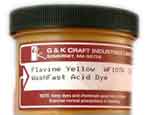Which is the best dye formulation to use for a nylon/elastane sports skirt?
Which is the best dye formulation to use for a nylon/elastane sports skirt?
Name: Liz
—ADVERTISEMENTS—
Washfast Acid dyes
at Paradise Fibers

Washfast Acid dyes
Also known as Nylomine dyes, excellent for use on nylon. One ounce of dye will dye six pounds of fiber!
at Paradise Fibers

Washfast Acid dyes
Also known as Nylomine dyes, excellent for use on nylon. One ounce of dye will dye six pounds of fiber!
Country or region: Greater Manchester, England
Message: I have a 80% Nylon and 20% Elastane sports blue/yellow piping skirt which I would like to dye all black. Which is the best dye formulation to use? Thanks, Liz
Nylon should be dyed with acid dyes. See my page on "How to dye nylon or polyamide".
Unfortunately, nylon requires heat in order to bond well to acid dyes, but elastane is very sensitive to heat. See my page, "How to Dye Spandex (also known as Lycra® or elastane)". You will have to use a lower-than-ideal temperature to dye the nylon, in order to avoid deforming and ruining the shape of the elastane in the skirt. Use the hottest water permitted in the care instructions included in the skirt; do not exceed 60°C (140°F). You will need to use a mild acid such as vinegar, carefully following the instructions provided with your dye.
Note that some nylons have a surface finish on them that will prevent dye from reaching inside the fibers, making dyeing impossible. It's difficult to predict whether the nylon in your skirt may have this problem. Dye-repelling finishes include stain resistance, permanent press finishes, 'performance' wicking finishes, and anti-pilling finishes, among others. Some nylons simply cannot be dyed satisfactorily.
It's possible that the piping in your skirt is not made of nylon at all. The fiber content of "trim" is frequently left off of garment labels. If the piping is made of polyester, you will not be able to dye it, because dyeing polyester requires extremely high heat, which will certainly damage the elastane in your skirt. Polyester will remain the original color after being dyed with most dyes.
If there is no problem with a surface finish, and if they are both made of the same fiber, the yellow and blue in your skirt will both be black, after you dye them with a large amount of black dye. However, they are unlikely to be the same shade of black. This is because all dyes are transparent, and always show through a little of the underlying color. The piping will turn from yellow to a greenish black, while the fabric will turn from blue to a bluish black. Using a lot of dye powder will help, to get the darkest black possible. You can repeat the entire dye process, using more dye powder, if the skirt is not a dark enough black after the first time. Using a temperature lower than nylon's ideal 85°C (185°F), so that you don't distort the spandex, may make it impossible to obtain the blackest black.
You can find acid dyes to buy in the UK at several different online retailers, such as Kemtex Educational Supplies or George Weil. See "Sources for Dyeing Supplies Around the World"; scroll down to the section of dye retailers in Europe.
(Please help support this web site. Thank you.)
(Please help support this web site. Thank you.)
Posted: Tuesday - June 21, 2011 at 08:23 AM
Follow this blog on twitter here.
Quick Links
- All About Dyes & Dyeing Top -
- Top of this blog -
- FAQ -
- The Dye Forum -
- How to Tie Dye - How to Batik -
- Books - Toys - Plants -
- Top of this blog -
- FAQ -
- The Dye Forum -
- How to Tie Dye - How to Batik -
- Books - Toys - Plants -
More in this category:
- -
Statistics
Total entries in this blog:
Total entries in this category:
Published On: Aug 29, 2012 02:49 PM
Total entries in this category:
Published On: Aug 29, 2012 02:49 PM